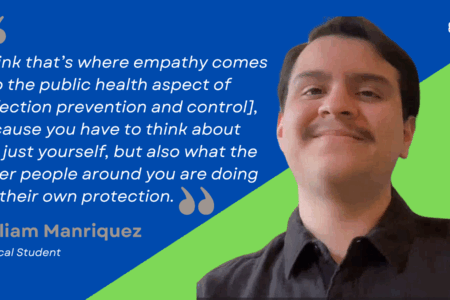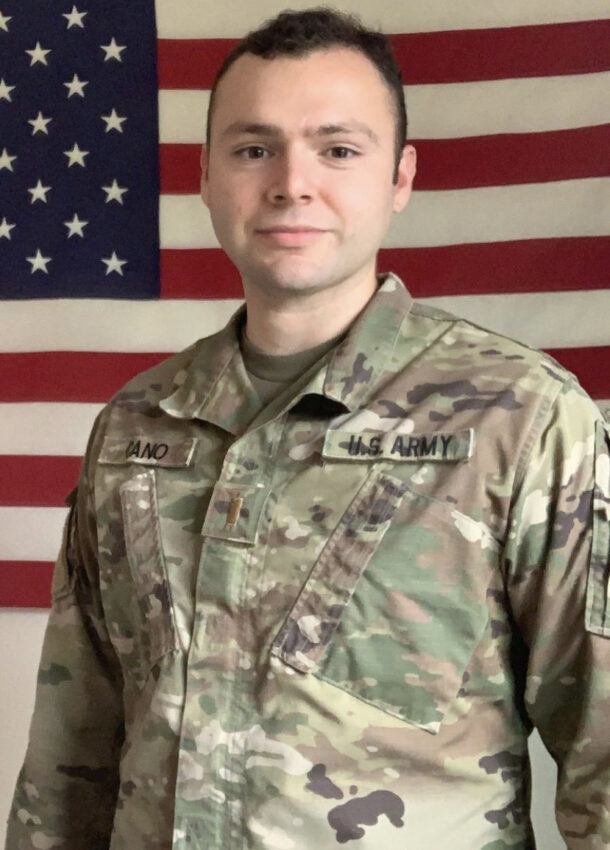
Share On Social!
“You just keep pushing. You just keep pushing.”
That’s something Diego Cano has told himself throughout his life.
When he failed a health certification test on the first try. When he struggled to balance work, study, and military service. When he wasn’t sure what direction to pursue.
Today, Cano has pushed through many hardships and is following his passion of helping others as a rising second-year medical student at the Paul L. Foster School of Medicine at Texas Tech University Health Science Center El Paso and as a Robert A. Winn clinical investigator intern at UT Health San Antonio’s Institute for Health Promotion Research.
While he is accomplishing a lot of great things, rarely did it come easily.
Cano’s Early Life and Finding a Passion
Cano grew up in Palmview, a small city of about 17,000 people on the Texas-Mexico border, with his mother and father and three brothers.
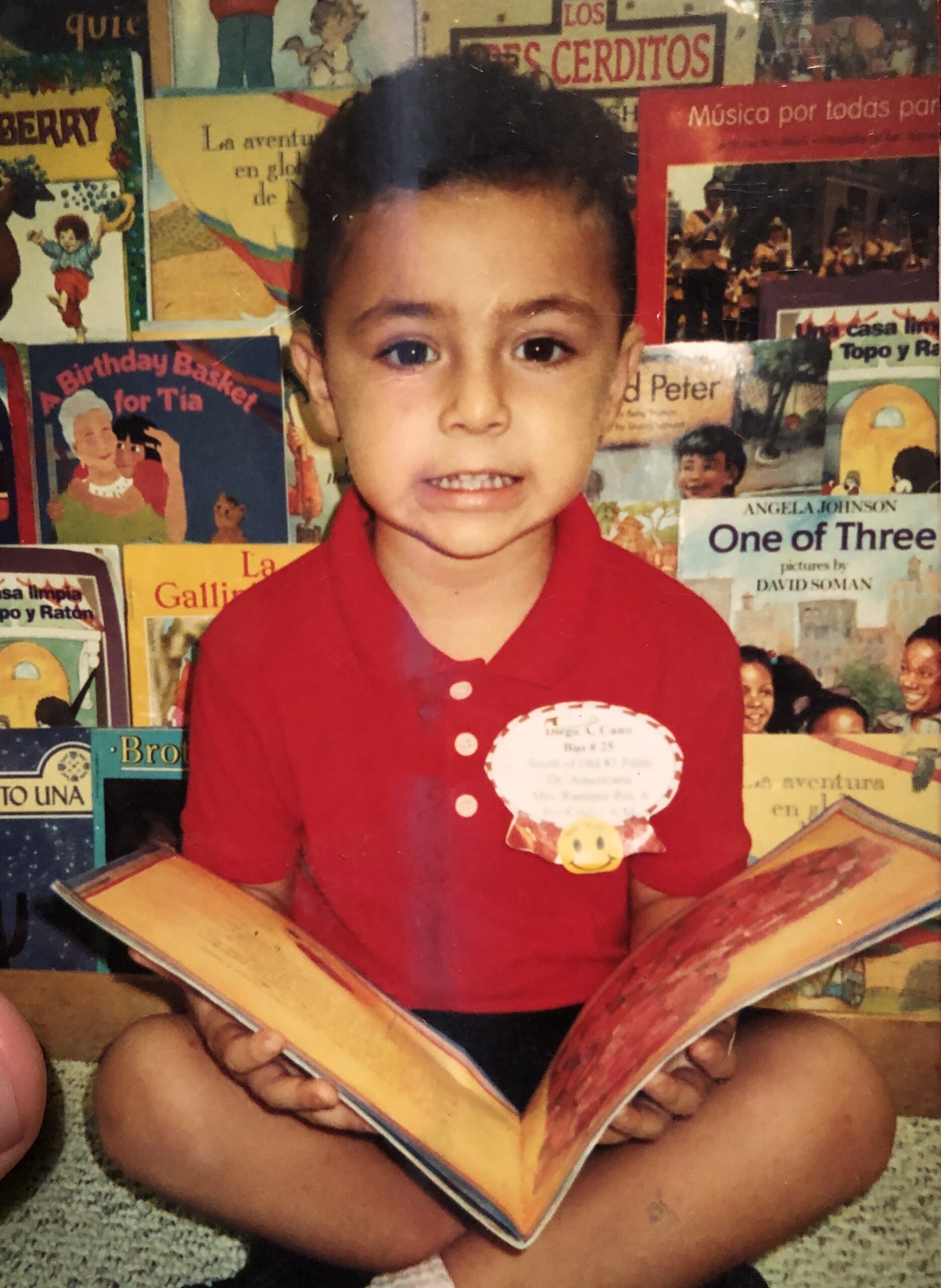
He saw how hard his parents worked every day to make a living.
While he knew education could be a way to make a better life for himself, education was not something actively emphasized at home. His parents often had to focus on working long hours to keep a roof over their heads and food on the table.
However, after joining orchestra in high school and forming new friendships with classmates, Cano began to envision a different future.
“Changing social groups and surrounding myself with the right people in high school was a turning point early in my life,” Cano said. “My new friends valued the opportunity of being able to go to school with intention to learn, to pursue an education. Reflecting on it now, I am grateful for their friendship.”
Cano also credits his oldest brother for encouraging him to follow his interests in the sciences and healthcare.
“Since I was 15 years old, my brother has always supported me, even now to this day at 28 years old,” Cano said.
Cano Enters the Military
After graduating high school in 2015, Cano immediately headed to basic training for the Texas Army National Guard with the goal of becoming a combat medic.
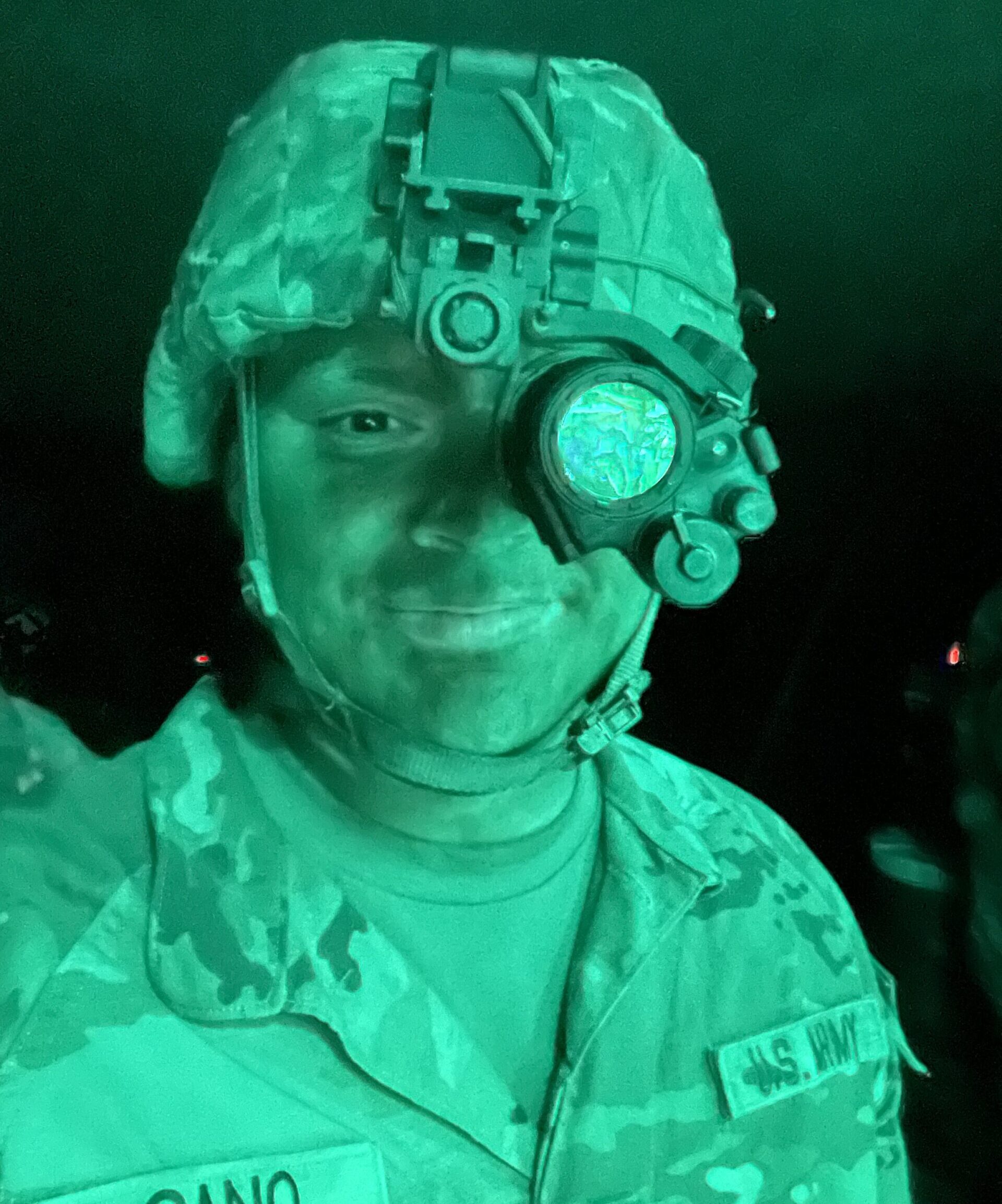
At age 17, getting through the 10 weeks of basic training at Fort Sill, Oklahoma, and 16 weeks of the combat medic specialist course at Fort Sam Houston, Texas, Cano’s experiences helped shape who he is.
“Looking back, it was pretty cool having those experiences so early on,” Cano said. “I was just a kid, but I was already starting to grow—becoming more mature and disciplined.”
As he continued through the rigorous training and studying, Cano would take his National Registry Emergency Medical Technician (EMT) certification exam.
Unfortunately, he failed the test.
While it was a tough blow, Cano continued to push himself and with mentorship from his new Army friends, he developed study habits that fit him best.
“I learned you must be able to apply your knowledge before the exam or else things will not go as well. Although it was a difficult reality to face, it was a needed experience to have early on. Failure pushes you to grow, it teaches you, humbles you, and challenges you to stand back up and keep pushing,” Cano said.
Cano took the test again and passed.
At age 18, he returned home and began working as a licensed EMT in the Rio Grande Valley area. As an EMT, Cano wanted to provide the best care possible for his patients.
Yet he saw first-hand the lack of health resources that hurt the community he grew up in.
“Going back home and working as an EMT is when I was able to see the health [gaps] within the community and it sparked in me that I wanted to do more for my patients,” Cano said.
Cano Balances College, Military, and Life
While Cano continued to work as an EMT, he earned an Army ROTC scholarship opportunity to begin college. In Fall 2016, he was finally able to start at UT San Antonio.
However, the transition came with challenges.
“I was taking 18 credit hours every semester while trying to find balance within my degree, relationships, the ROTC program, and my continued Army obligations,” Cano said.
There were many long days and nights. It proved to be difficult balancing academic and military obligations.
However, Cano credits his girlfriend Juliana with helping him through the process as well.
“She has been my constant throughout this entire journey. We have been able to see each other grow not just at a personal level but now within our profession,” Cano said.
Cano would eventually graduate with his bachelor’s degree in kinesiology. Soon after he was called into duty by the military.
“The moment I graduated college in May 2020, it was very much non-stop mobilizations back-to-back” he said.
Cano’s Journey to Medical School
Following college, Cano took some time away from his education to complete the missions he was assigned.
In April 2020, Cano was sent to Camp Mabry in Austin, Texas, to distribute personal protective equipment to soldiers for the COVID-19 pandemic. Later, in November 2020, Cano was sent to Fort Indiantown Gap, Penn., for a warfighter training exercise.
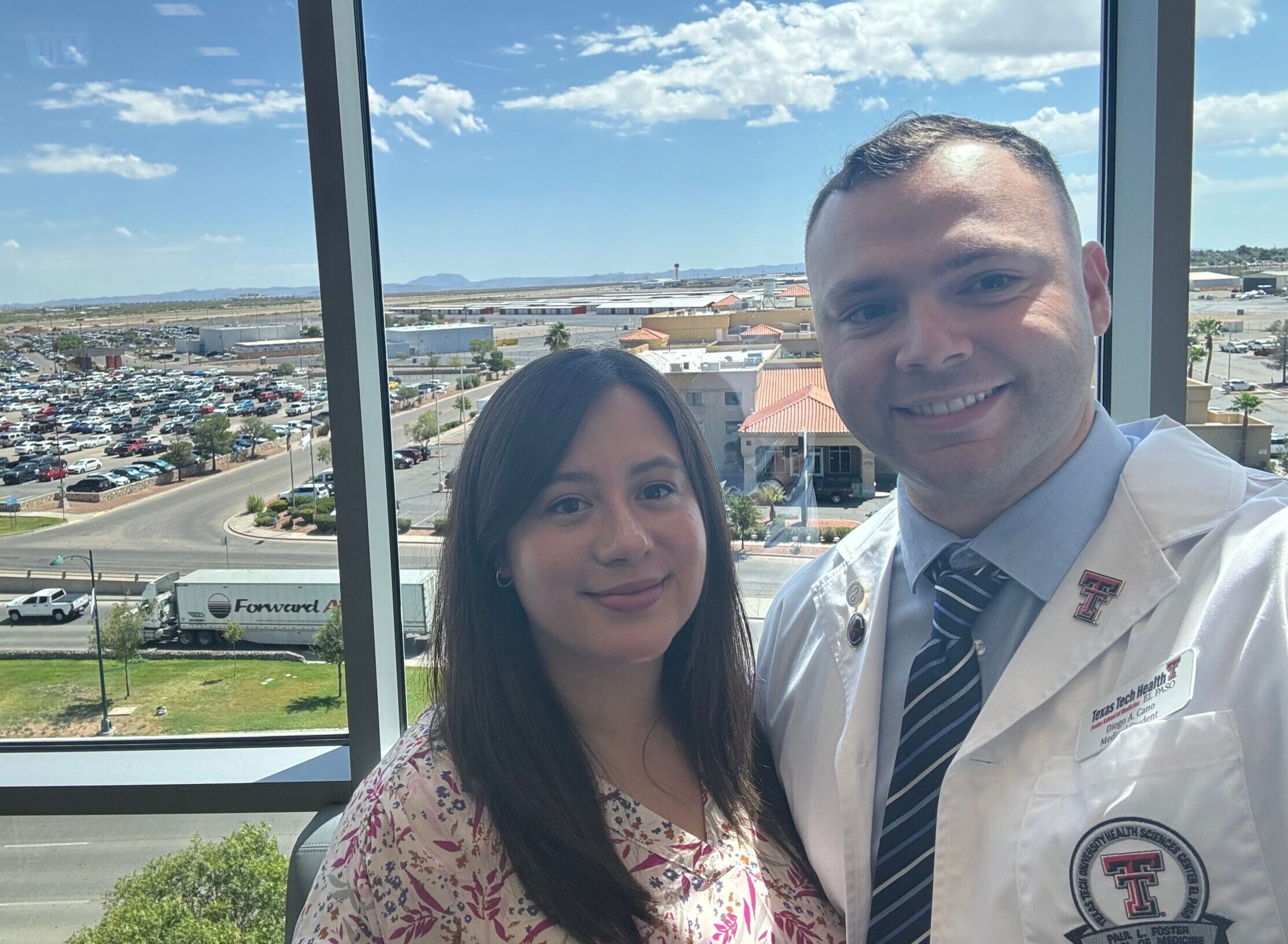
Cano was ordered to Camp Bullis in San Antonio in February 2021, where he worked to counter COVID-19 misinformation, educated soldiers and local community members about the virus and vaccine, and supported vaccine distribution efforts.
Through these experiences, Cano further developed a disciplined work ethic, collaborative mindset, and compassion to serve others.
In September 2022, Cano was sent on a Texas border mission, Operation Lone Star, for 7 months. Here he served as the Task Force Eagle Medical Officer and orchestrated medical operations throughout Eagle Pass and Del Rio, Texas.
As Cano gained more insight and hands-on experiences with the healthcare field, he began to think more about his future.
While considering his next steps, Juliana reminded him of how valuable his education and experiences were and to consider applying to medical school.
Cano began taking the prerequisite courses needed before starting the application process.
He would spend months studying and eventually took the Medical College Admission Test (MCAT). However, Cano’s focus would shift from medical school back to another mission and begin a field training exercise in California.
“I remember Juliana called me while out in a field training exercise out at Camp Roberts, California saying, ‘Hey, your [MCAT] score came out,’ since I barely had any service on my phone to load my MCAT score,” Cano said.
After good news about his MCAT score, Cano continued to prioritize the steps needed to reach his goal of medical school.
“Once we got through the primary and secondary applications and the interviews started coming in, it felt like a lot of weight off your shoulders, especially since the process takes place over several months,” Cano said.
Cano’s Future
Interview after interview and step after step, Cano kept pushing and would finally fulfill his goal and start as a medical student at Texas Tech University Health Science Center El Paso.
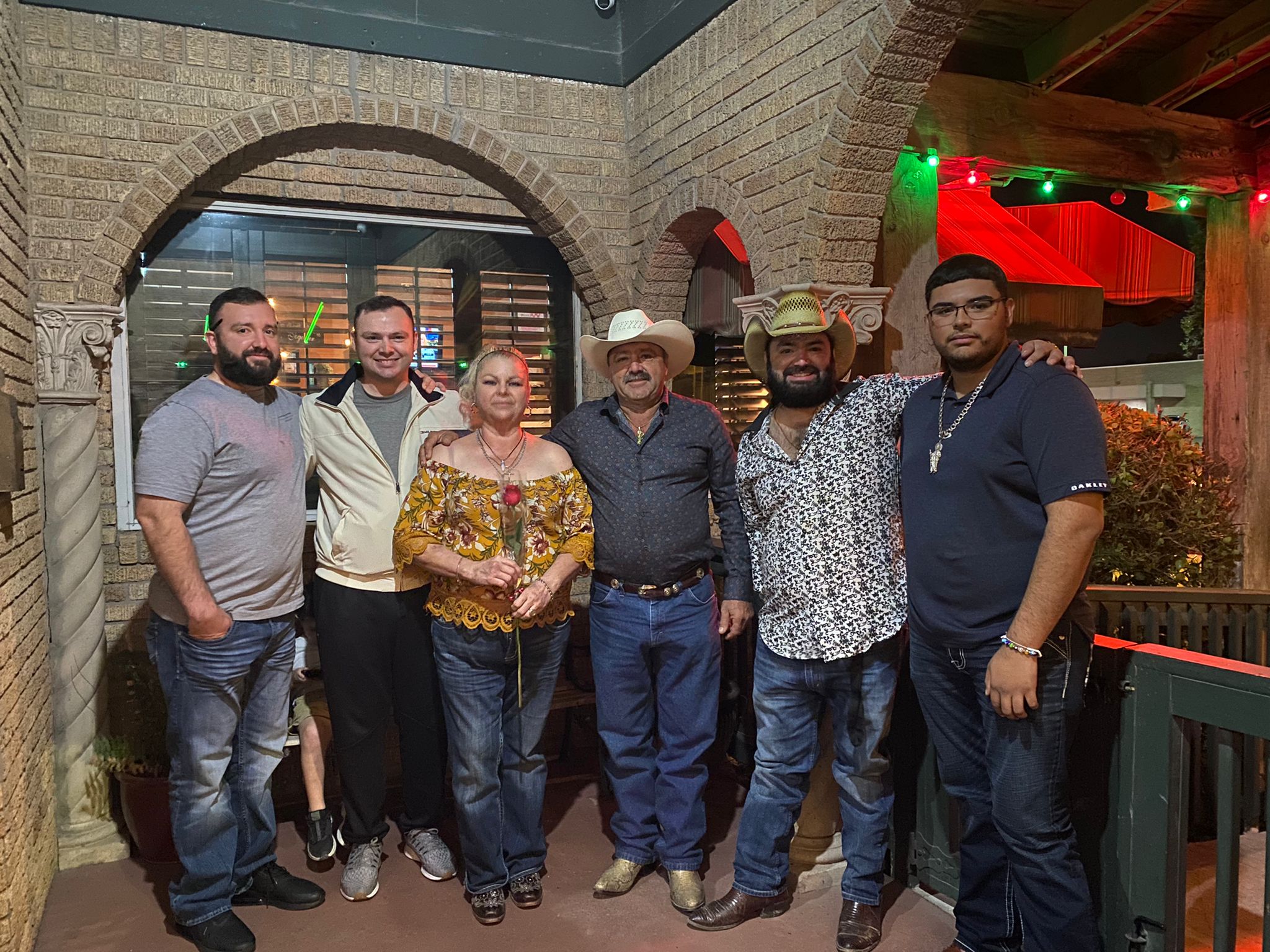
“I chose El Paso because it really reminded me of home—the people … speaking Spanish again,” he said.
Calling Cano a non-traditional student may seem like an understatement.
However, he wears the badge proudly.
“First generation everything. I am the first in my family to enlist, first to become an Army officer, the first to graduate from college, and now the first to attend medical school,” Cano said.
As he continues his education, Cano participated in the six-week summer internship at the Institute for Health Promotion Research (IHPR) at UT Health San Antonio and its Mays Cancer Center through the Robert A. Winn Clinical Investigator Pathway Program.
While the journey continues for Cano as he takes the steps to reaching his next goal, he hopes to inspire other young people who dream to accomplish the same.
“Just keep pushing. I have made a lot of easy and hard decisions, a lot of sacrifices to get where I am. But I never gave up, I just kept pushing,” he said.
Explore More:
EducationBy The Numbers
84
percent
of Latino parents support public funding for afterschool programs
This success story was produced by Salud America! with support from the Robert Wood Johnson Foundation.
The stories are intended for educational and informative purposes. References to specific policymakers, individuals, schools, policies, or companies have been included solely to advance these purposes and do not constitute an endorsement, sponsorship, or recommendation. Stories are based on and told by real community members and are the opinions and views of the individuals whose stories are told. Organization and activities described were not supported by Salud America! or the Robert Wood Johnson Foundation and do not necessarily represent the views of Salud America! or the Robert Wood Johnson Foundation.

